I learned so much last week at Agile Roots 2015 last week. Check out the artifacts, they’ll inspire you too! Janet Gregory and I did a plenary talk on “Do Testers Have to Code… To Be Useful?” I always love pair presenting with Janet. She did a super job of explaining our views on the subject. To summarize: Your software delivery team already has coders, and they can write test code as well as production code. But we think testers do need technical awareness to help them communicate and collaborate well with other team members.
This blog post is meant to be about our workshop, though, so on to that. We had 90 minutes and a great group of participants to think about what skills a team needs to help them build quality in to their software product. Testing isn’t a phase, as our friend Elisabeth Hendrickson so aptly says. We know we can’t test quality into a product (I am not sure who first said that, but I’ve heard it for 20 years! Still, people seem to try!) Quality has to be baked in. What skills help us do that? As testers, Janet and I tend to focus on testing skills, but are they the most important?
T-Shaped Skills
Each of us has a wide range of thinking (aka ‘soft’ or ‘people’) and technical skills. Most of us also have some area of special passion where we have deep skills. For example, I have lots of experience in exploratory testing, test automation, eliciting examples from customers, SQL, and so on. But I can bring the most value to my team with my ability to learn domains quickly – that’s my deep skill. I learned about the T-Shaped Skills concept from Rob Lambert. Each workshop participant noted their skills which can help their team build in quality, one per sticky note.
Commitment to quality
Quality is like Mom and apple pie. Ask any software delivery team, they’ll say they want to create a high-quality product. But are they really committed to doing that? What will they do when they encounter an obstacle? We shared stories and discussed the importance of making that commitment mean something. It will take a variety of skills, experience and perspectives to creatively overcome all the things that get in the way of building in quality. Get your team together and talk about what your commitment to quality really mans.
Square-Shaped Teams
When all team members put their T-shaped skill sets together, we get square-shaped teams, see Adam Knight‘s blog post on this topic. Our workshop participants compared their individual skills, grouped similar ones, and discussed which were most important. (Pictures of the results are at the end of this post). What skills can each specialty bring to the party? If an essential skill is missing, how can your team obtain it?
Transferring knowledge, effecting change
We discussed collaboration techniques teams can use to make the best use of specialized skills they need. Learning new skills or sharing specialized ones can mean change, and change is hard. Patterns from More Fearless Change by Linda Rising and Mary Lynn Manns are helpful as you try to spread new ideas or encourage new experiments.
Each workshop group discussed the skill area they deemed most important, and thought of experiments they could try with their own teams to build those skills. Interestingly, communication skills, rather than technical testing skills such as exploratory testing or test automation, were tops in three out of the five table groups. The other two groups chose related skill areas: conflict resolution and gaining empathy with users. Interesting experiments were tried. One group decided to try teaching a simple skill to see how hard it might be. One of the group members was left handed, and set about teaching the others to write left-handed. This proved a simple way to learn how to teach a skill, a pre-requisite to helping spread skills across the team! Another group played an icebreaker game to learn more about each other as a first step in improving communication. Again, this is something simple and fun that any team can try.
Giveaways
With only 90 minutes for our workshop, we didn’t have time to try out a lot of techniques to transfer skills. For myself, a key giveaway (I learned that term from Alex Schwarz and Fanny Pittack at last year’s Agile Testing Days, I like it better than takeaways) were that what so many play down as “soft” skills form the core strength of a team’s ability to build quality into their software. If they can’t communicate with each other or their customer effectively, it’s hard even to define what quality means to them and to their customer. Another “aha” moment was realizing that extremely simple exercises such as an icebreaker game or teaching a skill like writing left-handed provide a lot of insights and help teams work together better.
Below are the skill charts from each of our groups (WP won’t let me format these in a nicer way, for some reason). You can also check out our slides, which have some good resources for further reading. Janet and I will do a similar workshop at Agile Testing Days, but we’ll have a whole day there, so we are looking forward to more in-depth outcomes which we can share.

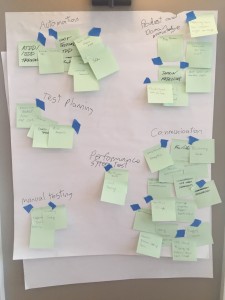
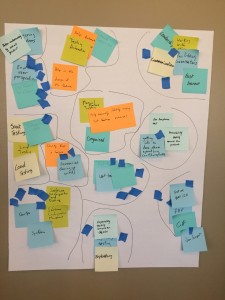
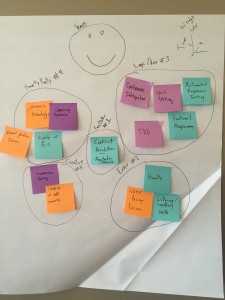
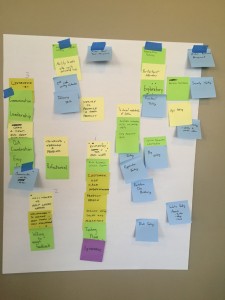
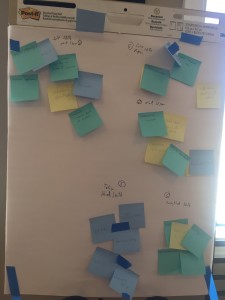
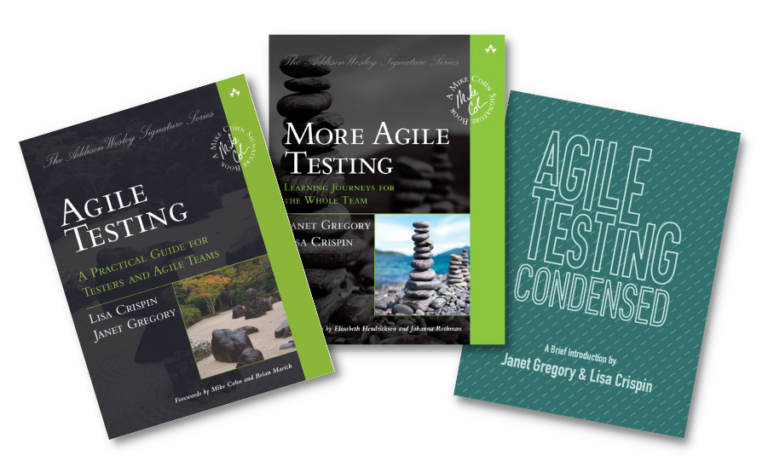
7 comments on “What skills should we learn & teach to build quality in?”
[…] What skills should we learn & teach to build quality in? – Lisa Crispin – https://lisacrispin.mystagingwebsite.com/2015/06/27/what-skills-should-we-learn-teach-to-build-quality-in/ […]
[…] What skills should we learn & teach to build quality in? Written by: Lisa Crispin […]
[…] Source: lisacrispin.com/2015/06/27/what-skills-should-we-learn-teach-to-build-quality-in/ […]
This is an interesting topic, and one I’m finding “rearing” it’s head a lot on teams I’m seeing on the teams I’ve seen implement agile.
We still seem to be very focused on “role”. We know T-shaped skills help, and ideally having people who can do multiple tasks also help. But then again, anytime someone steps out of that “role” that we know them in, there is automatic fear. And sometimes that fear can be crippling.
Thank you for this article and knowledge sharing! really would like to participate in your workshops someday!
[…] Lambert, Lisa Crispin and Janet Gregory worked on a great model called the T-shaped tester. Where the horizontal stands […]
[…] Lisa Crispin – What skills should we learn & teach to build quality in? […]